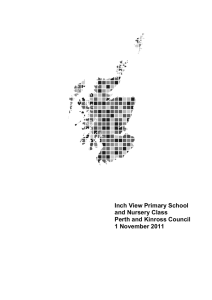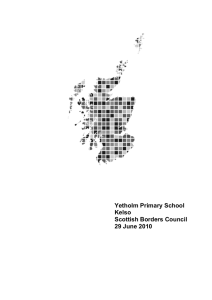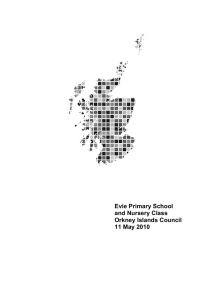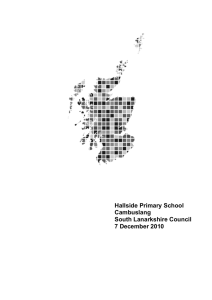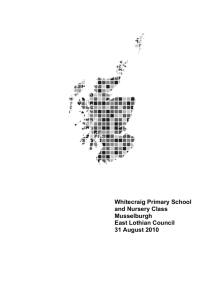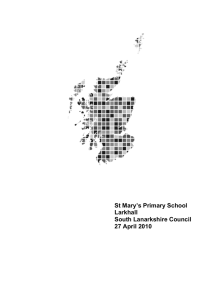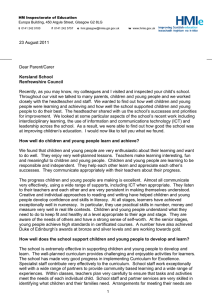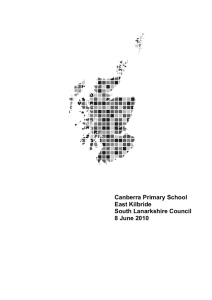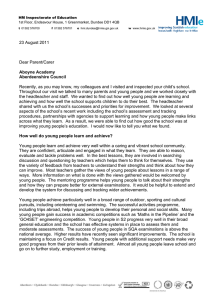Keig School Aberdeenshire Council 14 June 2011
advertisement
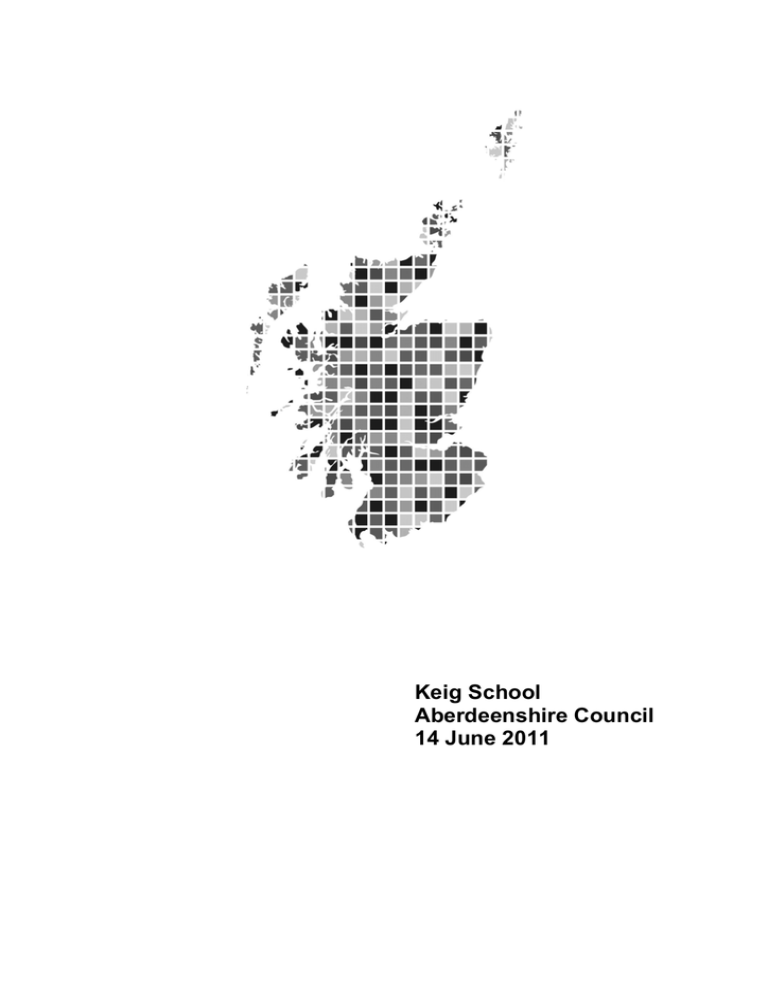
Keig School Aberdeenshire Council 14 June 2011 HM Inspectorate of Education (HMIE) inspects schools in order to let parents1, children and the local community know whether their school2 provides a good education. Inspectors also discuss with school staff how they can improve the quality of education. At the beginning of the inspection, we ask the headteacher and staff about the strengths of the school, what needs to improve, and how they know. We use the information they give us to help us plan what we are going to look at. During the inspection, we go into classes and join other activities in which children are involved. We also gather the views of children, parents, staff and members of the local community. We find their views very helpful and use them together with the other information we have collected to arrive at our view of the quality of education. This report tells you what we found during the inspection and the quality of education in the school. We describe how well children are doing, how good the school is at helping them to learn and how well it cares for them. We comment on how well staff, parents and children work together and how they go about improving the school. We also comment on how well the school works with other groups in the community, including services which support children. Finally, we focus on how well the school is led and how staff help the school achieve its aims. If you would like to learn more about our inspection of the school, please visit www.hmie.gov.uk. Here you can find analyses of questionnaire returns from children, parents and staff. We will not provide questionnaire analyses where the numbers of returns are so small that they could identify individuals. 1 Throughout this report, the term ‘parents’ should be taken to include foster carers, residential care staff and carers who are relatives or friends. 2 The term ‘school’ includes the nursery class or classes where appropriate. Contents 1. The school 2. Particular strengths of the school 3. How well do children learn and achieve? 4. How well do staff work with others to support children’s learning? 5. Are staff and children actively involved in improving their school community? 6. Does the school have high expectations of all children? 7. Does the school have a clear sense of direction? 8. What happens next? 1. The school Keig School is a non-denominational school. It serves the village of Keig and the surrounding rural area. The roll was 39 when the inspection was carried out in April 2011. Children’s attendance was above the national average in 2009/2010. 1 2. Particular strengths of the school • The range and quality of children’s learning experiences. • Polite, well behaved children who are keen to learn. • The care and commitment of the headteacher and all staff. 3. How well do children learn and achieve? Learning and achievement Across the school, children respond effectively to teachers’ provision of a range of high-quality learning experiences. Interactions between teachers and children are very positive and ensure effective learning. Children are very well motivated and keen to learn and can discuss their strengths and next steps in learning. Almost all children are confident in thinking for themselves and work together well in groups. Children’s skills in independent learning are developing effectively. At all stages, children are developing a sound understanding of what it means to be a good citizen. Children at the upper stages gain confidence through carrying out a range of responsibilities, including working as young leaders to help younger children. Teachers make effective use of responsibility groups, in which children from all stages gain valuable skills working together on school-based projects. As a result, children learn to take responsibility in a range of tasks, including the pupil council and the gardening group. Children have a strong awareness of how to care for the environment. They benefit from their work on the Eco group, in the outdoor classroom and in the Forest Schools project. As a result, the school has an Eco-Schools Scotland bronze award. Children improve their fitness and gain confidence through participating in sporting and cultural activities. These include the school pantomime, football, residential trips, netball and country 2 dancing. Children have an effective awareness of the benefits of healthy eating and regular physical activity. The school has Health Promoting School status. At all stages, children are developing knowledge and understanding through studying a range of topics. Children at the upper and middle stages show an appropriate awareness of aspects such as digestion as part of their study of the human body. In the early stages, children respond well in learning about the sun and moon. Across the school, almost all children are making effective progress in developing their skills in reading, and most are doing so in writing. The majority of children are progressing appropriately in mathematics. In English language, at all stages, almost all children talk together well in groups and listen attentively to information and instructions. Almost all children read with appropriate fluency and expression and show understanding of what they have read. Children read well for information and show appropriate skills in using the Internet for research. Children at all stages write effectively for a wide range of purposes and produce effective written accounts, poems and stories. These include reports on visits to local places of interest, imaginative stories, and sensitive poems on the theme of Culloden. In a few children’s written work, standards of accuracy in spelling and neatness of presentation are not yet high enough. In mathematics, almost all children are developing effective skills in written calculation. Children’s skills in using computers to practise skills and display information are developing appropriately. There is scope to improve children’s skills and understanding in aspects of mathematics. These aspects include mental calculation, place value and understanding of decimals. Children across the school are developing appropriate skills in problem solving. Curriculum and meeting learning needs The headteacher and staff have made an effective start in improving children’s learning experiences, taking appropriate account of Curriculum for Excellence. Staff plan activities which allow children to make effective use of their literacy and numeracy skills in a range of 3 contexts. In the early stages, children respond well to appropriate opportunities to learn through play. Across the school, staff ensure that children can exercise choice and learn skills of cooperation. Children’s skills in enterprise education are developing well through participation a range of activities such as organising school events. The school’s Music Week allows children to learn new skills while working with professional musicians. The headteacher recognises the need to continue to improve existing programmes in areas such as science and social subjects, to ensure progression in children’s learning. Visiting specialist staff enhance children’s learning experiences in physical education. Children benefit from two hours each week of high-quality physical education in accordance with national guidance. All staff, including the experienced support for learning teacher, know children very well and support them effectively. Staff mostly set tasks and activities at an appropriate level of difficulty for children. At times, the tasks set lack suitable challenge and the pace of learning is too slow. Children with identified needs receive effective support. A few children have individualised educational programmes which the school shares effectively with parents. Staff ensure that most children are aware of their strengths and what they need to do to improve their work. Homework is appropriately frequent and varied. 4. How well do staff work with others to support children’s learning? Very effective partnerships with parents and the wider community support children’s learning appropriately. The headteacher works well with the very supportive Parent Council. She makes effective use of newsletters, parents’ meetings and the school’s web site to keep parents suitably informed about the work of the school. Parents assist the school in a range of ways, including helping with trips, fund raising and participating in activities. Teachers provide helpful annual written reports to parents on children’s progress. The headteacher consults parents appropriately about sensitive health issues. She deals with 4 any concerns and complaints effectively and ensures that actions taken are noted appropriately. Children benefit from the school’s links with the wider community. The local minister assists with aspects of the school’s religious and moral education programme. The community policeman helps the school in, for example, ensuring that children are aware of Internet safety and the dangers of substance misuse. There are effective procedures to support children entering P1 and children transferring from P7 to Alford Academy. 5. Are staff and children actively involved in improving their school community? The headteacher and teachers are very committed to improving the school. They meet frequently to reflect on their work and to identify areas for possible improvement. Staff have recently developed a useful means to monitor children’s progress in aspects of literacy and numeracy as part of their work in Curriculum for Excellence. The headteacher and teachers observe and evaluate each other’s work and offer helpful comments about possible improvements. They work together using nationally agreed quality indicators to evaluate the school’s provision. The school takes appropriate account of parents’ and children’s views through regular written surveys. The results of these surveys are shared effectively with parents and children. There is scope to develop these arrangements for self evaluation to make them more systematic and rigorous, and ensure that all children make appropriate progress. 6. Does the school have high expectations of all children? Staff have suitably high expectations of children’s behaviour, to which children respond well. Across the school, children are friendly, very well behaved and courteous. Staff’s expectations of most aspects of children’s attainment are appropriately high. Teachers celebrate children’s achievements effectively and motivate children to achieve their best. Children respond well to staff’s high levels of care and 5 commitment and know how to obtain help and support if necessary. Teachers prepare children well for life in a multi-ethnic society. Staff provide children with appropriately frequent opportunities for religious observance. Staff implement an effective policy for child protection and know their roles and responsibilities well. 7. Does the school have a clear sense of direction? The headteacher has an appropriate vision for improving the school and shares this well with staff. With the help and support of teaching staff, she has ensured that children are well motivated and receive high-quality learning experiences. The headteacher’s plans for developing aspects of the school’s provision are clear and well judged. She is supported effectively by teachers in bringing about improvements. With the continuing support of the education authority, the school has the capacity to improve further. 8. What happens next? We are confident that the school will be able to make the necessary improvements in light of the inspection findings. As a result, we will make no more visits in connection with this inspection. The school and the education authority will inform parents about the school’s progress in improving the quality of education. We have agreed the following areas for improvement with the school and education authority. • Improve attainment in mathematics. • Continue to take forward the implementation of Curriculum for Excellence to ensure that all children make appropriate progress. 6 Quality indicators help schools and nursery classes, education authorities and inspectors to judge what is good and what needs to be improved in the work of a school and a nursery class. You can find these quality indicators in the HMIE publications How good is our school? and The Child at the Centre. Following the inspection of each school, the Scottish Government gathers evaluations of three important quality indicators to keep track of how well all Scottish schools and nursery classes are doing. Here are the evaluations for Keig School. Improvements in performance Learners’ experiences Meeting learning needs good very good good We also evaluated the following aspects of the work of the school. The curriculum Improvement through self-evaluation HM Inspector: Robert Barfoot 14 June 2011 7 good good When we write reports, we use the following word scale so that our readers can see clearly what our judgments mean. excellent very good good means means means satisfactory weak unsatisfactory means means means outstanding, sector leading major strengths important strengths with some areas for improvement strengths just outweigh weaknesses important weaknesses major weaknesses If you would like to find out more about our inspections or get an electronic copy of this report, please go to www.hmie.gov.uk. Please contact us if you want to know how to get the report in a different format, for example, in a translation, or if you wish to comment about any aspect of our inspections. You can contact us at HMIEenquiries@hmie.gsi.gov.uk or write to us at BMCT, HM Inspectorate of Education, Denholm House, Almondvale Business Park, Almondvale Way, Livingston EH54 6GA. Text phone users can contact us on 01506 600 236. This is a service for deaf users. Please do not use this number for voice calls as the line will not connect you to a member of staff. You can find our complaints procedure on our website www.hmie.gov.uk or alternatively you can contact our Complaints Manager, at the address above or by telephoning 01506 600259. Crown Copyright 2011 HM Inspectorate of Education
